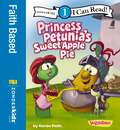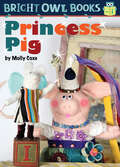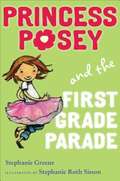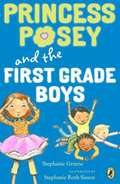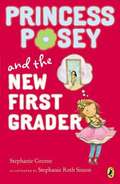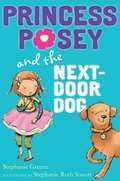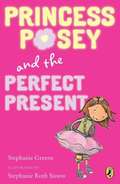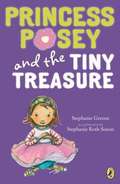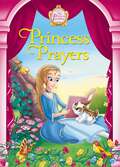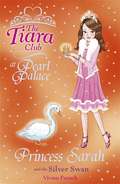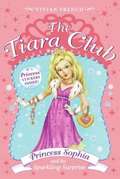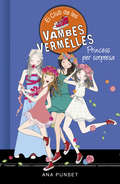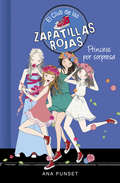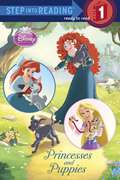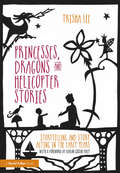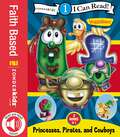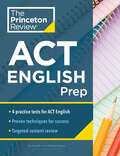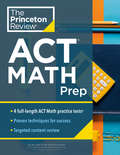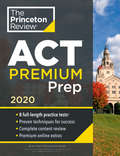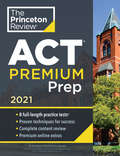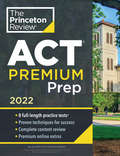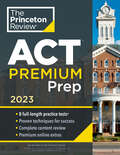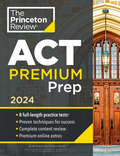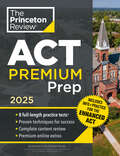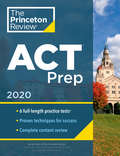- Table View
- List View
Princess Petunia's Sweet Apple Pie: Level 1 (I Can Read! / Big Idea Books / VeggieTales)
by Karen PothA Lesson in Being Helpful When the King of Scone holds a pie contest, every knight wants to win! But what happens when Princess Petunia gives up her oven to help another Veggie?
Princess Pig (Bright Owl Books)
by Molly CoxePig and Twig are playing Princess. Pig gets three wishes. But she wants more! This fun photographic easy-to-read story features the short "i" vowel sound. Kane Press's new series of super simple easy-to-reads, Bright Owl Books, launches with Molly Coxe's five photographic stories, which feature the short vowel sounds and are each only around 100 words. These irresistibly silly stories help kids learn to read through repetition and by teaching the basic building blocks of reading—vowel sounds—giving kids the perfect start on educational success.
Princess Posey & The First Grade Parade
by Greene Stephanie Stephanie Roth SissonPosey is really nervous about starting first grade. Instead of getting walked to her classroom, her mom has to drop her off at the Kiss-and-Go Lane. Then she'll have to walk into school and face the Monster of the Blue Hall all by herself. Worst of all, she has to do it without the one thing that always makes her feel brave and special: the tutu that turns her into the Pink Princess. But when Posey inspires her new teacher to throw a first-day parade in which all the kids are invited to wear whatever makes them feel the most comfortable, first grade starts to look a lot more promising. Posey will charm readers just graduating from easy-to-reads (and from kindergarten). Make reading sparkle with all of the Princess Posey chapter books! .
Princess Posey and the First-Grade Boys
by Stephanie Greene Stephanie Roth SissonThe first grade boys are driving Posey crazy! They can't seem to sit still, they make rude noises, and sometimes they are just plain weird. When Posey makes up a silly song about Henry, her friends all think it's funny. But it isn't so funny to Henry--or Miss Lee. Can Princess Posey's sparkly tutu help her find a way to fix this mess? Make reading sparkle with all of the Princess Posey chapter books!
Princess Posey and the New First Grader
by Stephanie Greene Stephanie Roth SissonThe sixth book in the Princess Posey chapter book series, and there's a new kid in class! Posey and her best friends, Nikki and Ava, do everything together. Then, new girl Grace joins Miss Lee's first grade class, and Posey worries that everything will change. Nikki and Ava can't stop talking about Grace's long princess hair, and when she joins the girls' recess games, they like her way of doing things better than Posey's. But when Grace accidentally teases Posey, she's had enough: she doesn't want to play with Grace ever again! Luckily, with a little help from Miss Lee and her trusty princess tutu, Posey realizes just how lonely Grace must feel. Posey partners up with her for reading time, and discovers that Grace could be more than just the new girl, if she gives her the chance. "Princess Posey is the perfect fictional friend for any first-grade girl."--Kirkus Reviews
Princess Posey and the Next-Door Dog
by Stephanie GreeneWhen Posey puts on her tutu, she turns into brave Princess Posey who can face anything. But when she has to write a story about a pet, the only one around is the new next-door dog who has a loud bark. Also, Posey has a secret. When she was little, a dog knocked her over to lick her ice cream and she's been afraid of dogs ever since. Can her tutu help her tackle this challenge? With dilemmas and solutions that ring exactly true for first-graders, Princess Posey is sure to charm every newly independent reader. Make reading sparkle with all of the Princess Posey chapter books! .
Princess Posey and the Perfect Present
by Stephanie GreeneFirst grade is fantastic. Posey loves her new best friends, they do fun things in class, and she adores her teacher. Then it's Miss Lee's birthday and Posey thinks her home-grown roses will be the best present of all. But when her friend brings a huge bouquet from a florist, Posey's roses don't seem special enough and she doesn't give them to her teacher after all. She feels horrible all day, but with some help from her mom, she comes up with the perfect, Posey way to make it up to Miss Lee--an after-birthday present. Make reading sparkle with all of the Princess Posey chapter books! .
Princess Posey and the Tiny Treasure
by Stephanie GreenePrincess Posey is back in another super cute chapter story! When Gramps buys Posey the most adorable stuffed animal-a pink piglet named Poinky who can perch on the top of her pencil-Posey can't wait to show him to all her friends. But when Poinky mistakenly ends up in Miss Lee's Consequence Drawer Posey is heartbroken. Will the Pink Princess be able to find her courage and explain things to Miss Lee? .
Princess Prayers (The Princess Parables)
by Jeanna Young Jacqueline Kinney JohnsonFifteen sweet rhyming prayers for little girls who know they are daughters of the one, true King, in a board book especially for little hands and hearts.Princess Prayers includes fifteen sweet prayers for little girls who want to live like princesses for God their King. Little girls will pray and learn about God&’s deep love form them alongside princesses Grace, Hope, Faith, Charity, and Joy. Every little girl is a princess, and this padded cover board book will help them engage with Scripture and discover how to open their hearts to God.Princess Prayers:Features the Princess Parable princess sistersIncludes beautiful full-color art
Princess Sarah and the Silver Swan (Tiara Club at Pearl Palace)
by Vivian FrenchIt's the end of term at Pearl Palace. The magical silver swan must fly down to the lake before Princess Sarah can win her sash. But will the horrid twins spoil the day?
Princess Sophia and the Sparkling Surprise (Tiara Club)
by Vivian FrenchEvery Princess has to make her own ball gown, but Princess Perfecta is determined to spoil the gowns and ruin the evening's surprise. Hopefully, Princess Sophia can show her what a true Perfect Princess is.
Princess per sorpresa (Sèrie El Club de les Vambes Vermelles #Volumen 14)
by Ana PunsetLes noies del club de les Vambes Vermelles han demostrat que res no pot separar-les: ni els nois, ni la distància, ni els profes, ni els pares, ni les Pavetes. Juntes són imparables. Quina nova aventura els espera? La Laia acaba de rebre una notícia bomba: el Mario se'n va a viure un any a Los Angeles! Però ella encara no sap si està preparada per mantenir una relació a distància. Per sort, és l'aniversari de la Raquel i han decidit anar-se'n a Pot Aventura per celebrar-ho. A més, la Gia ha vingut a Barcelona d'improvís i també s'apunta al pla. Tot i que està una mica estranya... I si amaga alguna cosa?
Princess por sorpresa (Serie El Club de las Zapatillas Rojas #Volumen 14)
by Ana PunsetLas chicas del club de las Zapatillas Rojas han demostrado que nada puede separarlas: ni los chicos, ni la distancia, ni los profes, ni los padres, ni las Pitiminís. Juntas pueden con todo. ¿Qué nueva aventura les espera? Lucía acaba de recibir una noticia bomba: ¡Mario se va a vivir un año a Los Ángeles! Pero ella todavía no sabe si está preparada para llevar una relación a distancia. Por suerte, es el cumpleaños de Susana y han decidido irse a Port Aventura para celebrarlo. Además, Gia ha venido a Barcelona de improviso y se une al plan. Aunque está un poco rara... ¿estará escondiendo algo?
Princesses and Puppies (Step into Reading)
by Jennifer Liberts WeinbergAriel, Merida, Belle, and all the Disney princesses laugh and play with cute, cuddly puppies in this Step 2 leveled reader. It's perfect for girls ages 4–6 who are just learning to read on their own.
Princesses, Dragons and Helicopter Stories: Storytelling and story acting in the early years
by Trisha LeeStories and fantasy play engage all young children and help them to draw connections and make sense of the world. MakeBelieve Arts Helicopter Stories are tried, tested and proven to have a significant impact on children’s literacy and communication skills, their confidence and social and emotional development. Based on the storytelling and story acting curriculum of Vivian Gussin Paley, this book provides a practical, step-by-step guide to using this approach with young children. Covering all aspects of the approach, Artistic Director Trisha Lee shows you how you can introduce Helicopter Stories to children for the first time, scribing their tales and then bring their ideas to life by acting them out. Full of anecdotes and practical examples from a wide range of settings, the book includes: Clear guidelines and rules for scribing children’s stories, creating a stage and acting out stories How to deal with taboos and sensitive issues in children’s stories How to involve children who are unwilling to speak or act Supporting children with English as an Additional Language Links to show how the approach supports children’s holistic development Providing an accessible guide to an approach that is gaining international recognition, and featuring a foreword by Vivian Gussin Paley, this book will be essential reading for all those that want to support children’s learning in a way that is fun, engaging and proven to work.
Princesses, Pirates, and Cowboys: Level 1 (I Can Read! / Big Idea Books / VeggieTales)
by Karen PothCome join the VeggieTales gang as they learn about how to live like God wants us to. This three-book collection of VeggieTales I Can Read stories provides young readers with an ideal gift they will enjoy for years to come.This collection includes: Who Wants to be a Pirate? The Fairest Town in the West Princess Petunia’s Sweet Apple Pie
Princeton Review ACT English Prep: 4 Practice Tests + Review + Strategy for the ACT English Section (College Test Preparation)
by The Princeton ReviewBoost your ACT English score with this brand new all-in-one guide, filled with complete content review of the English section, targeted advice from experts, and 4 full-length practice tests for ACT English.Techniques That Actually Work• Tried-and-true strategies to help you avoid traps and beat the ACT® English Test• Essential tactics to help you work smarter, not harder• Tips for pacing yourself and guessing logicallyEverything You Need for a High Score• Expert review of ACT English concepts, including punctuation, grammar, sentence structure, purpose questions, modifiers, and frequently confused words• Step-by-step instruction on how to approach each question type• Bulleted chapter summary pages for quick referencePractice Your Way to Excellence• 4 ACT English practice tests with detailed answer explanations• End-of-chapter drills to help cement your knowledgeAlso available: ACT Reading Prep, ACT Science Prep, and ACT Math Prep
Princeton Review ACT Math Prep: 4 Practice Tests + Review + Strategy for the ACT Math Section (College Test Preparation)
by The Princeton ReviewBoost your ACT Math score with this all-in-one subject guide, featuring a complete review of the Math section, targeted advice from experts, and 4 full-length practice tests for ACT Math!Techniques That Actually Work • Tried-and-true strategies to help you avoid traps and beat the ACT® Math Test • Essential tactics to help you work smarter, not harder • Tips for pacing yourself and guessing logicallyEverything You Need for a High Score • Expert review of ACT Math concepts, such as algebra and geometry • Step-by-step instruction on how to approach each question typePractice Your Way to Excellence • 4 ACT Math practice tests with detailed answer explanations • End-of-chapter drills to help cement your knowledgeAlso available: ACT English Prep, ACT Science Prep, and ACT Reading Prep
Princeton Review ACT Premium Prep, 2020: 8 Practice Tests + Content Review + Strategies (College Test Preparation)
by The Princeton ReviewTHE ALL-IN-ONE SOLUTION FOR YOUR HIGHEST POSSIBLE ACT SCORE—including 8 full-length practice tests for realistic prep, content reviews for all test sections, techniques for scoring success, and premium online extras.Techniques That Actually Work.• Powerful tactics to help you avoid traps and beat the ACT• Tips for pacing yourself and guessing logically Everything You Need to Know to Help Achieve a High Score.• Complete coverage of all test topics, including the reading and written portions• Thorough review of the skills necessary to help you ace all five ACT sectionsPractice Your Way to Excellence.• 8 full-length practice tests (4 in the book, 4 online) with detailed answer explanations• Instant score reports for online tests,with optional LiveGrader™ essay scoringAccess to Our Exclusive Premium Online Student Tools.• Online practice exams to hone your test-taking techniques• Video tutorials with expert advice from leading course instructors• Customized multi-week study plans• Exclusive access to college and university rankings• College admissions and financial aid tips• Special downloadable "College Admissions Insider" booklet packed with information about planning college visits, picking a perfect school, and writing standout essays
Princeton Review ACT Premium Prep, 2021: 8 Practice Tests + Content Review + Strategies (College Test Preparation)
by The Princeton ReviewTHE ALL-IN-ONE SOLUTION FOR YOUR HIGHEST POSSIBLE ACT SCORE—WITH THE MOST PRACTICE ON THE MARKET! Includes 8 full-length practice tests for realistic prep, content reviews for all test sections, techniques for scoring success, and premium online extras. PLUS! Up to date information on the new ACT Online Testing option, superscores, section retesting, and more via your included online Student Tools.Techniques That Actually Work.• Powerful tactics to help you avoid traps and beat the ACT• Tips for pacing yourself and guessing logically Everything You Need to Know to Help Achieve a High Score.• Complete coverage of all test topics, including the reading and written portions• Thorough review of the skills necessary to help you ace all five ACT sections• Information on the ACT Online Testing option, superscores, and morePractice Your Way to Excellence.• 8 full-length practice tests (4 in the book, 4 online) with detailed answer explanations• Instant score reports for online tests and essay checklists to help you grade the writing testsAccess to Our Exclusive Premium Online Student Tools.• Online practice exams to hone your test-taking techniques• Video tutorials with expert advice from leading course instructors• Customized multi-week study plans• Exclusive access to college and university rankings• College admissions and financial aid tips• Special downloadable "College Admissions Insider" booklet packed with information about planning college visits, picking a perfect school, and writing standout essays
Princeton Review ACT Premium Prep, 2022: 8 Practice Tests + Content Review + Strategies (College Test Preparation)
by The Princeton ReviewTHIS IS THE ALL-IN-ONE SOLUTION FOR YOUR HIGHEST POSSIBLE ACT SCORE—WITH THE MOST PRACTICE ON THE MARKET! Includes 8 full-length practice tests (4 in the book and 4 online) for realistic prep, content reviews for all test sections, techniques for scoring success, and premium online extras. Techniques That Actually Work • Powerful tactics to help you avoid traps and beat the ACT • Tips for pacing yourself and guessing logically Everything You Need to Know to Help Achieve a High Score • Complete coverage of all test topics, including the reading and written portions • Thorough review of the skills necessary to help you ace all five ACT sections • Information on the ACT Online Testing option, superscores, and more Practice Your Way to Excellence • 8 full-length practice tests (4 in the book, 4 online) with detailed answer explanations • Instant score reports for online tests and essay checklists to help you grade the writing tests Access to Our Exclusive Premium Online Student Tools • Online practice exams to hone your test-taking techniques • Video tutorials with expert advice from leading course instructors • Customized multi-week study plans • Exclusive access to college and university rankings • College admissions and financial aid tips • Special downloadable "College Admissions Insider" booklet packed with information about planning college visits, picking a perfect school, and writing standout essays
Princeton Review ACT Premium Prep, 2023: 8 Practice Tests + Content Review + Strategies (College Test Preparation)
by The Princeton ReviewTHIS IS THE ALL-IN-ONE SOLUTION FOR YOUR HIGHEST POSSIBLE ACT SCORE—WITH THE MOST PRACTICE ON THE MARKET! Includes 8 full-length practice tests (4 in the book and 4 online) for realistic prep, content reviews for all test sections, techniques for scoring success, and premium online extras. Techniques That Actually Work • Powerful tactics to help you avoid traps and beat the ACT • Tips for pacing yourself and guessing logically Everything You Need for a High Score • Complete coverage of all test topics, including the reading and written portions • Thorough review of the skills necessary to help you ace all five ACT sections • Information on the ACT Online Testing option, superscores, and more Practice Your Way to Excellence • 8 full-length practice tests (4 in the book, 4 online) with detailed answer explanations • Instant score reports for online tests and essay checklists to help you grade the writing tests Access to Our Exclusive Premium Online Student Tools • Online practice exams to hone your test-taking techniques • Video tutorials with expert advice from leading course instructors • Customized multi-week study plans • Exclusive access to college and university rankings • College admissions and financial aid tips • Special downloadable "College Admissions Insider" booklet packed with information about planning college visits, picking a perfect school, and writing standout essays
Princeton Review ACT Premium Prep, 2024: 8 Practice Tests + Content Review + Strategies (College Test Preparation)
by The Princeton ReviewTHIS IS THE ALL-IN-ONE SOLUTION FOR YOUR HIGHEST POSSIBLE ACT SCORE—WITH THE MOST PRACTICE ON THE MARKET! Includes 8 full-length practice tests (4 in the book and 4 online) for realistic prep, content reviews for all test sections, techniques for scoring success, and premium online extras.Techniques That Actually Work• Powerful tactics to help you avoid traps and beat the ACT• Tips for pacing yourself and guessing logicallyEverything You Need for a High Score• Complete coverage of all test topics, including the reading and written portions• Thorough review of the skills necessary to help you ace all five ACT sections• Information on the ACT Online Testing option, superscores, and morePractice Your Way to Excellence• 8 full-length practice tests (4 in the book, 4 online) with detailed answer explanations• Instant score reports for online tests and essay checklists to help you grade the writing testsAccess to Our Exclusive Premium Online Student Tools• Online practice exams to hone your test-taking techniques• Video tutorials with expert advice from leading course instructors• Customized multi-week study plans• Exclusive access to college and university rankings• College admissions and financial aid tips• Special downloadable "College Admissions Insider" booklet packed with information about planning college visits, picking a perfect school, and writing standout essays
Princeton Review ACT Premium Prep, 2025: 8 Practice Tests + Content Review, Plus Info & Practice for the New Enhanced ACT (College Test Preparation)
by The Princeton ReviewTHE ALL-IN-ONE SOLUTION FOR YOUR HIGHEST POSSIBLE ACT SCORE! Contains 8 full-length practice tests (4 in book & 4 online), comprehensive content review, scoring strategies, and premium online extras. Now also includes guidance and practice for the new Enhanced ACT!Publisher's note: The ACT is changing in 2025—but only for some students. Depending on how you take the exam (on Saturday or in school) and which format (online or paper), you may take the either "current" ACT or the newer Enhanced ACT. This book, ACT PREMIUM PREP 2025, contains content review that can be used with either version of the test, plus 8 practice tests for the current ACT, one of which is also provided as an Enhanced ACT test. Techniques That Actually Work• Powerful tactics to help you avoid traps and beat the ACT• Tips for pacing yourself and guessing logicallyEverything You Need for a High Score• Complete coverage of all test topics• Thorough review of tested ACT skills• Information on the ACT Online Testing option, superscores, and morePractice Your Way to Excellence• 8 full-length practice tests (4 in the book, 4 online) with detailed answer explanations• Instant score reports for online tests• Essay checklists to help you grade the writing testsExclusive Premium Online Student Tools• Online practice exams to hone your test-taking techniques• Video tutorials with expert advice from leading course instructors• Customized multi-week study plans• College and university rankings, admissions, and financial aid tips• Downloadable "College Admissions Insider" packed with information on college visits, school selection, and writing winning essays
Princeton Review ACT Prep, 2020: 6 Practice Tests + Content Review + Strategies (College Test Preparation)
by The Princeton ReviewTHE PRINCETON REVIEW GETS RESULTS. Get all the prep you need to ace the ACT with 6 full-length practice tests, thorough ACT topic reviews, and extra practice online.Techniques That Actually Work.• Powerful tactics to help you avoid traps and beat the ACT• Tips for pacing yourself and guessing logically Everything You Need to Know to Help Achieve a High Score.• Complete coverage of all test topics, including the reading and written portions• Thorough review of the skills necessary to ace all five ACT sectionsPractice Your Way to Excellence.• 6 full-length practice tests (4 in the book, 2 online) with detailed answer explanations• Instant score reports for online tests, with optional LiveGrader™essay scoring
